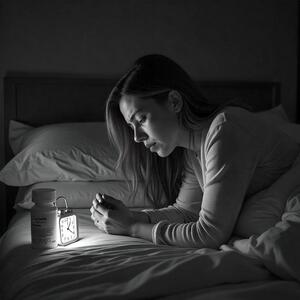Does Zopiclone Help With Anxiety-Related Insomnia?
الجسم
Anxiety and insomnia often go hand in hand, creating a cycle where stress prevents sleep, and lack of rest exacerbates anxiety. For those struggling with anxiety-related insomnia, Zopiclone is a commonly prescribed sleep aid. But does Zopiclone truly help in managing sleep issues caused by anxiety? In this article, we will explore the effectiveness of Zopiclone, its benefits, potential risks, and alternatives.
Understanding Zopiclone
Zopiclone is a non-benzodiazepine hypnotic drug used primarily for the short-term treatment of insomnia. It works by affecting the brain’s gamma-aminobutyric acid (GABA) receptors, which promote relaxation and sedation. Unlike benzodiazepines, Zopiclone is considered to have a lower risk of dependence, but it is still classified as a controlled substance in many countries due to its potential for abuse.
How Zopiclone Helps With Anxiety-Related Insomnia
1. Promotes Sleep Initiation
One of the primary effects of Zopiclone is its ability to help people fall asleep faster. Anxiety can cause racing thoughts and hyperarousal, making it difficult to drift off. Zopiclone works by calming brain activity, allowing users to relax and sleep more easily.
2. Improves Sleep Duration
Individuals with anxiety often wake up multiple times throughout the night. Zopiclone helps extend total sleep time by reducing nighttime awakenings, allowing for more restful and uninterrupted sleep.
3. Reduces Sleep Latency
Anxiety-related insomnia can cause prolonged periods of wakefulness before falling asleep. Zopiclone shortens this latency period, meaning users can fall asleep quicker instead of lying awake for hours.
Limitations and Risks of Zopiclone for Anxiety-Related Insomnia
While Zopiclone is effective, it does not directly treat anxiety — it only addresses the sleep disturbances caused by it. Here are some key limitations and risks to consider:
1. Short-Term Use Only
Zopiclone is recommended for short-term use (typically 7 to 14 days) due to its potential for tolerance, dependence, and withdrawal symptoms. Prolonged use can lead to reduced effectiveness and addiction.
2. Potential Side Effects
Common side effects of Zopiclone include:
-
Drowsiness and fatigue
-
Dry mouth
-
Dizziness
-
Memory issues
-
Unpleasant metallic taste
More severe side effects, such as hallucinations or sleepwalking, are rare but possible.
3. Risk of Dependence and Withdrawal
Regular use of Zopiclone can lead to psychological and physical dependence. Withdrawal symptoms may include rebound insomnia, anxiety, restlessness, and irritability if stopped abruptly.
4. Not a Long-Term Solution for Anxiety
While Zopiclone may temporarily aid sleep, it does not address the underlying causes of anxiety. For long-term management, therapy, lifestyle changes, and alternative treatments should be considered.
Alternatives to Zopiclone for Anxiety-Related Insomnia
If you are looking for long-term solutions, consider the following alternatives:
1. Cognitive Behavioral Therapy for Insomnia (CBT-I)
CBT-I is a scientifically proven method for treating insomnia by addressing thought patterns and behaviors that contribute to sleep disturbances.
2. Melatonin Supplements
Melatonin is a natural hormone that helps regulate sleep. Unlike Zopiclone, it is non-addictive and can be taken long-term under medical supervision.
3. Lifestyle Modifications
-
Reduce caffeine and alcohol intake
-
Practice relaxation techniques (e.g., meditation, deep breathing)
-
Establish a consistent sleep schedule
-
Exercise regularly to reduce anxiety levels
4. Prescription Alternatives
For chronic anxiety, doctors may prescribe antidepressants (e.g., SSRIs, SNRIs) or other sleep aids with fewer dependency risks than Zopiclone.
Conclusion: Is Zopiclone Right for You?
Buy Zopiclone online can be an effective short-term solution for anxiety-related insomnia, helping individuals fall asleep faster and stay asleep longer. However, it does not treat anxiety itself and comes with potential risks, including dependence and withdrawal. If you are struggling with long-term sleep problems related to anxiety, visit our online pharmacy ukzopicloneonline to purchase your treatment pack today. Discuss thinking about alternatives with your healthcare professional to find a safer and more lasting solution.
Have you used Zopiclone for anxiety-related insomnia? Share your experience in the comments below!






تعليقات